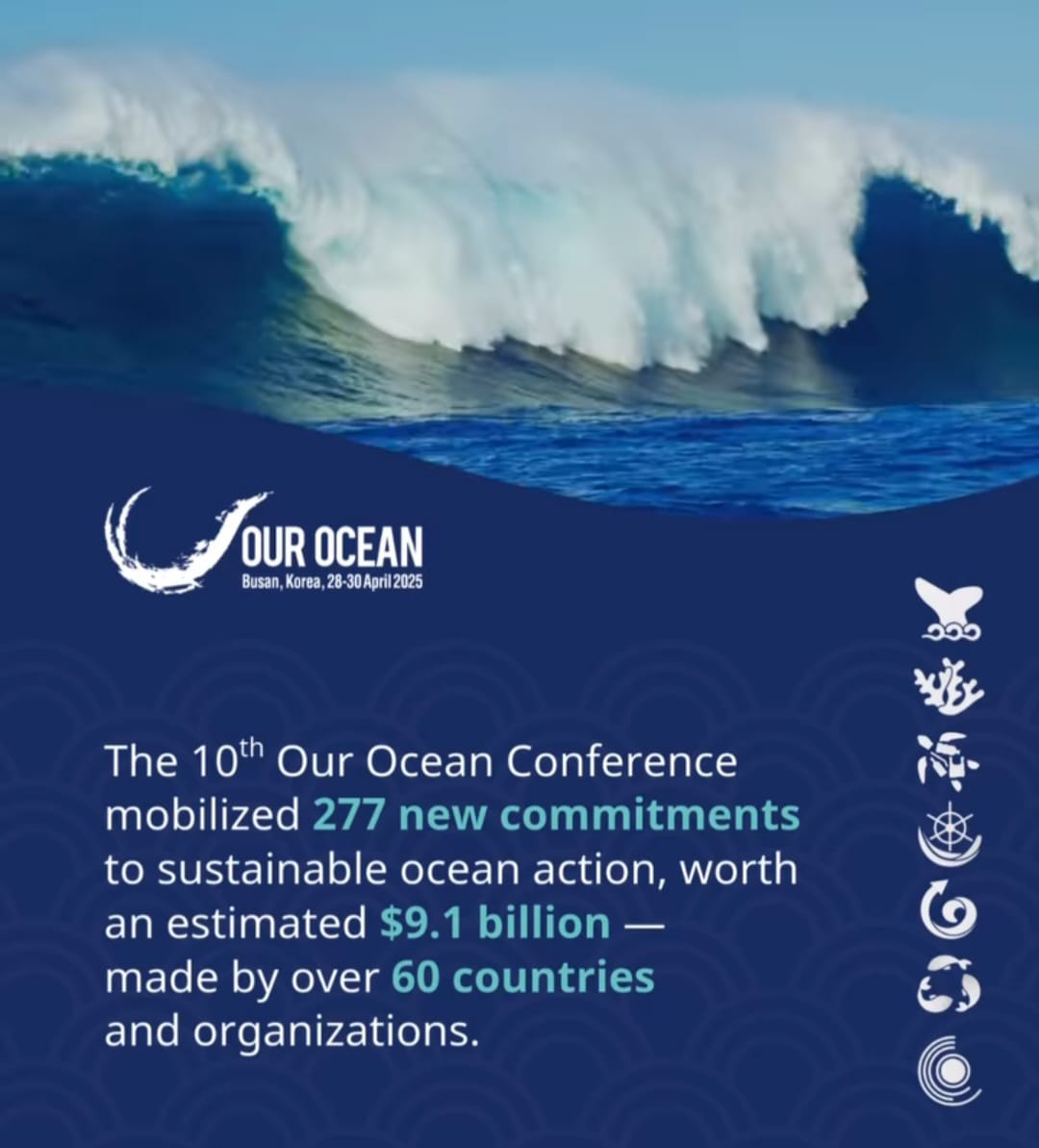The 10th Our Ocean Conference (OOC) in Busan, Republic of Korea, has confirmed the mobilization of 277 new commitments to sustainable ocean action.
The 277 new commitment is equivalent to $9.1 billion of commitments to sustainable ocean action
Since its inaugural meeting in 2014, OOC has become a leading platform for governments, businesses and civil society to make commitments advancing marine conservation, ocean-based climate solutions and sustainable blue economy initiatives.
This will add to the $160 billion mobilized over the past decade.
Commitments were made by more than 60 different countries and organizations across 6 key ocean action areas: Ocean Climate Nexus, Marine Pollution, Marine Protected Area, Sustainable Blue Economy, Sustainable Fisheries, and Maritime Security.
Some key themes have come to the fore, reflecting the theme of the Conference – Our Ocean, Our Action.

Key Themes
The Republic of Korea announced “digital oceans” as the priority cross-cutting theme.
This placed a special emphasis on exploring how digital technology is driving new ocean actions and discussing international cooperation to accelerate these advancements.
Nearly 10% of OOC10 commitments address this theme, ranging from the use of AI to monitor fisheries and marine protected areas, to enhancing satellite and drone imagery, and deploying eDNA techniques that can help better catalogue marine biodiversity.
Developing the sustainable blue economy has been highlighted as a key priority for the global ocean community, generating the highest single financial commitment of any action area by far – USD $4.5 billion – and the second-highest overall number of commitments (59).
From supporting ocean entrepreneurship and developing businesses, developing blue economy frameworks, and enhancing sustainable small-scale fisheries and aquaculture operations, to deploying digital technologies that can support economic development, blue economy commitments were diverse in scope and scale.
Investment in research and development was a clear priority for OOC10 commitment makers, with over 30 commitments related to funding for research that will improve understanding of the ocean-climate nexus, polar regions, fisheries, biodiversity, marine pollution, emerging technologies, and more.
While the ocean-climate nexus is an ongoing and crucial focus of the OOC, green shipping and nature-based solutions were two topics which took center stage at the 10th anniversary Conference, each accounting for about 15% of climate commitments which will support the transition to green fuels, sustainable port operations, and reducing vessel emissions.
New Commitments
A notable number of commitments were announced for the financing of marine nature-based climate solutions – nearly $150 million in finance – with work focusing on restoring and better enhancing coastal blue carbon ecosystems such as kelp forests.
This year’s conference generated a wide variety of capacity-building commitments across six OOC action areas, including nearly 20 commitments focused on improving maritime security capacity and counter-IUU efforts around the world (predominantly in the Pacific and West Africa).
There were also more than 10 commitments that establish or expand marine and environmental education or career training programs.
It also announced diverse, sector-specific capacity building programs from waste management and plastics reduction, to coastal resilience and MPA management.
Background On Our Ocean Conference
For ten years, the Our Ocean Conference has been an effective and consistent mechanism for generating marine conservation ambition.
At OOC10, over 45 commitments focused on identifying and assessing new sites for future marine protected areas (MPAs), expansion and improvement of management of existing MPAs, and new protections for key habitats such as turtle nesting grounds.
In order to meet ambitious international goals and commitments, including climate and biodiversity targets, and protecting 30% of land and sea by 2030 (30×30), increasing and expanding MPAs and other conservation measures is critical.
The Biodiversity Beyond National Jurisdiction (BBNJ) Agreement provides an opportunity for large-scale protections of marine ecosystems of the high seas, and governments at OOC10 made progress toward the ratification and implementation of the BBNJ.
Commitments announced finance to support ratification and implementation of the Agreement, and policy steps to identify target locations for MPAs on the high seas.
Marine pollution Commitments
Marine Pollution especially plastic pollution, remains a key area of focus for the international community.
Over 20% of marine pollution commitments addressed plastic pollution specifically, demonstrating its prominence in current ocean policy.
These commitments include new programs to support plastic recycling, comprehensive national plastic pollution plans, and education and community engagement initiatives.
Other issues relating to marine pollution, including noise, wastewater, land-based pollution, and ghost gear were also addressed in a range of commitments.
Our Ocean Conference
The Our Ocean Conference gathers approximately 1,000 global leaders from various sectors, including heads of state and high-level government officials from over 100 countries, and representatives from more than 400 international and non-profit organizations.
Together, they discuss diverse and concrete actions for a sustainable ocean.
Since the inaugural Our Ocean Conference in the United States in 2014, over 2,600 voluntary commitments have been announced at subsequent conferences held in Chile, the European Union, Indonesia, Norway, Palau, and Greece.
Today, the conference serves as a leading platform for establishing global ocean norms.
Key achievements of OOC include expanding marine protected areas, reducing marine plastic pollution, eradicating Illegal, Unreported, and Unregulated (IUU) fishing, reducing lost and discarded fishing gear, ratifying the High Seas Treaty, supporting ocean research, science and technology, and addressing the impact of climate change on the ocean.




